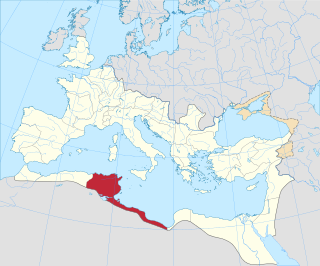See also
Name list
This page or section lists people that share the same given name. If an internal link led you here, you may wish to change that link to point directly to the intended article.
Fulgentius is a Latin male given name which means "bright, brilliant". It may refer to:
Porphyry may refer to:
Bartholomaeus Anglicus, also known as Bartholomew the Englishman and Berthelet, was an early 13th-century Scholastic of Paris, a member of the Franciscan order. He was the author of the compendium De proprietatibus rerum, dated c.1240, an early forerunner of the encyclopedia and a widely cited book in the Middle Ages. Bartholomew also held senior positions within the church and was appointed Bishop of Łuków in what is now Poland, although he was not consecrated to that position.
Ailill is a male name in Old Irish. It is a prominent name in Irish mythology, as for Ailill mac Máta, King of Connacht and husband of Queen Medb, on whom Shakespeare based the Fairy Queen Mab. Ailill was a popular given name in medieval Ireland, meaning something like "beauty".

Timotheus is a masculine male name. It is a latinized version of the Greek name Τιμόθεος (Timόtheos) meaning "one who honours God", from τιμή "honour" and θεός "god". The English version Timothy is a common name in several countries.
Fabius Planciades Fulgentius was a Latin writer of late antiquity. Four extant works are commonly attributed to him, as well as a possible fifth which some scholars include in compilations with much reservation. His mythography was greatly admired and highly influential throughout much of the medieval period, but it is viewed with little favour today.

December 31 - Eastern Orthodox liturgical calendar - January 2

Fabius Claudius Gordianus Fulgentius, also known as Fulgentius of Ruspe was a North African Christian prelate who served as Bishop of Ruspe, in modern-day Tunisia, during the 5th and 6th century. He has been venerated as a saint.

Thelepte was a city in the Roman province of Byzacena, now in western Tunisia. It is located near the border with Algeria about 5 km north from the modern town of Fériana and 30 km south-west of the provincial capital Kasserine.
Ruspe or Ruspae was a town in the Roman province of Byzacena, in Africa propria. It served as the episcopal see of Saint Fulgentius of Ruspe. It is now a Roman Catholic titular bishopric.
Cyriacus is a given name of Greek origin. The Greek Κυριακός (Kyriakos) means "belonging to the lord". It has strong Christian connotations and is one of the most common names found in Christian inscriptions from ancient Rome. The Latin Dominicus has the same meaning and may originate as a translation of the Greek name.
Saint Fulgentius may refer to:
Agapius may refer to:
Junillus Africanus was Quaestor of the Sacred Palace in the court of the Byzantine Emperor Justinian I. He is best known for his work on biblical exegesis, Instituta regularia divinae legis. According to M.L.W. Laistner, Junillus' work was based on the writings of one of the teachers of the School of Nisibis, Paul the Persian, and because Paul had been influenced by the writings of Theodore of Mopsuestia, Junillus' Instituta helped make Western theologians familiar with the Antiochene school of exegesis.
Quintian or Quintianus (Latin), from Quintus, is a male given name meaning "the fifth" and may refer to:

Fulgentius of Cartagena, born in Cartagena in the 6th century and died in 630, was Bishop of Ecija (Astigi), in Hispania.
Pseudo-Augustine is the name given by scholars to the authors, collectively, of works falsely attributed to Augustine of Hippo. Augustine himself in his Retractiones lists many of his works, while his disciple Possidius tried to provide a complete list in his Indiculus. Despite this check, false attributions to Augustine abound.
Cynog is a Welsh male given name. In Old Welsh, it was pronounced and written as Kynauc, Kennauc, and in other ways.
Flavianus—the adjectival form of the name Flavius in Latin—may refer to:
Fulgencio is a Spanish male given name. It is derived from the Latin name Fulgentius, which means "bright, brilliant".

Mididi was a Carthaginian and Roman settlement during antiquity, located at what is now Henchir-Medded, Tunisia. 14 neo-punic inscriptions, known as the Mididi inscriptions, were found in Mididi by René Basset.